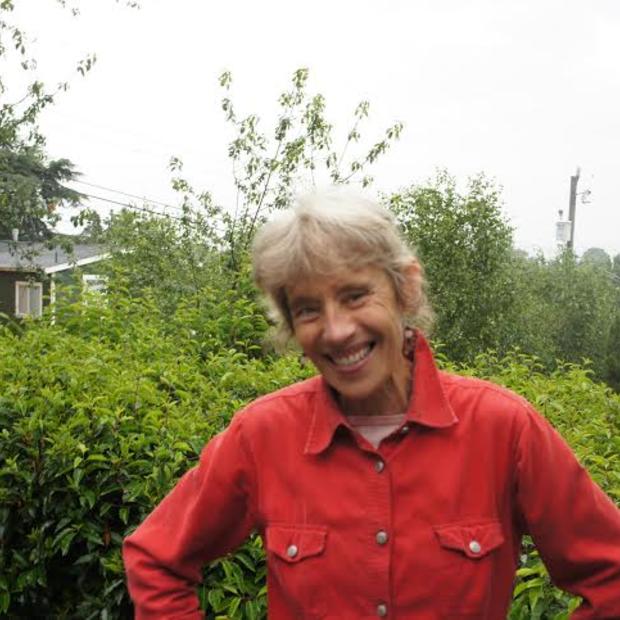Klickitat Canyon Winery, Columbia Gorge. It's 99 degrees in the midday sun with dry heat as we walk uphill to the vineyard. Robin Dobson began this family owned organic winery in 1993. He points to a landscape of oak woodland and native bunchgrasses. A yellow rumped warbler flies by. Get down on your knees and look up, he suggests. “It looks almost like an old-growth. Big things towering above your head. You can see the balsam root coming up here between the bunch grasses.”
Click on the player above or here to listen to the audio version of this story.
The diverse habitat includes now-dried yellow balsam root, and attracts birds — white breasted nuthatch, mourning doves — and native insects like praying mantis and swallowtail butterflies. “They want protection. They want to be able to nest near these bunch grasses. A lot of the insects are beneficial insects. This is where they spend the summer on these grasses and on some of the other dry vegetation.”
The pesticide-free landscape is also perfect for growing the organic wine Klickitat Canyon Winery specializes in, sulfite free, vegan, no additives. "We are completely traditionalist. We want to make wine in the old world tradition,” says Kathleen Perillo, environmental educator and biologist at Clark College in Vancouver and a winery partner. “We don’t see why it turned into a chemistry lab to begin with here in America, but it did.”
The greatness of grapes depends on the land and location they’re grown in, says winery founder Dobson. “More so than if you start playing around with all the different ingredients in wine. Then you’re not really representing what they call terroir, which is the location. It just means you want something to represent where the grapes actually grew.”
Where these grapes grow is defined by the Columbia River Gorge, land forever marked by floods that broke at the end of the Ice Age. “All that water would come rushing down through the Gorge,” Dobson points to rounded rocks and soil deposited by the floods. “This is perfect for grapevines. It’s dry. It has all these rocky soils and that’s exactly what you want for a grapevine.” We keep walking.
Perillo notices a bluebird in an oak tree. We take a quick peak in a birdhouse attached to a fence post and see six babies, mouths wide open. Forty percent of America’s 10,000 bird species are in decline because of habitat loss, says Perillo. “So we’re just trying to give them the habitat they need.”
The biggest challenge for this organic winery isn’t cutworms or leaf hoppers, it’s the uncertainty of weather. The last two Augusts were cold, the previous two perfect. "As we go into more climate change there’s a lot more unknowns and how well these things are going to do might become more problematic,” Dobson says. But an organic winery like Klickitat Canyon that's focused on quality winemaking may be able to weather the storm. “A grower’s perspective is he wants to grow grapes and he wants a lot of grapes because that’s how he’s making money. The winemaker wants a grapevine that struggles and puts as much flavor and those kind of things into the grape.”
Klickitat Canyon Winery is the only organic winery on the Washington side of the Gorge and one of only a handful in the state. Dobson and Perillo hope to change that with their non-profit, the Center for Ecodynamic Agriculture. Ecodynamic, explains Perillo, is a method of creating habitat so diverse it not only attracts a rich variety of insects able to resist pests, but supplies food and habitat for other organisms.
“We’re taking a broader picture and looking at the whole ecology of a system, a landscape-level look, and saying, 'How can we knit the ecology back together? How can we take the wild and enmesh it into the managed ecosystem?'” Partners of the center include Clark County Extension and WSU Vancouver. Five willing farms are interested in trying the organic approach.
Meanwhile WSU entomologist, Dr. David James, is monitoring Klickitat Canyon Winery to see if natural habitat results in a more diverse population of insects. “In our monitoring last year none of the pests reached any levels that needed spraying.” James needs a few more years of data before he can promote “beneficials” and the drought tolerant plants that will attract them, but Europe, New Zealand and Australia have shown there’s precedent.
Robin Dobson and Kathleen Perillo call it a long-term strategy. Think about your grandchildren and their grandchildren, they say, and you’ll want to take care of the land for time immemorial.
Meanwhile, the heat pushes us back to the wine cellar. A bottle of Meadowlark Gold, a blend of white Granache, Viognier and Chardonnay is opened. This reporter, politely, takes a sip. This is wine grown as nature makes it.
Klickitat Canyon Winery’s new tasting room is open on the weekends in Stevenson. In the Puget Sound the wines can be found at the U District and West Seattle farmers markets.


